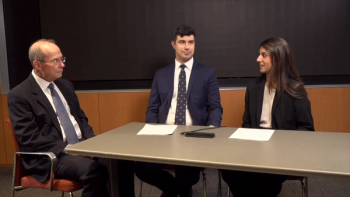
Sight Sciences announces first patient treated in TRIDENT European trial
Novel trial design will compare safety and effectiveness outcomes for the OMNI Surgical System and the iStent inject in lowering IOP as a standalone treatment option without concomitant cataract surgery.
Sight Sciences Inc. this week announced the first patient has been treated in its novel TRIDENT clinical trial, designed to demonstrate the OMNI Surgical System with higher volume as a safe and effective standalone treatment option, compared to implantation of iStent inject, in lowering IOP in adult patients with open-angle glaucoma.
With glaucoma, elevated IOP is the leading risk factor for the development and progression of the disease.
According to the company, the TRIDENT study is a prospective, randomized, multicenter, comparative trial evaluating the safety and effectiveness outcomes, including IOP reduction, for pseudophakic eyes (eyes which had previously undergone cataract surgery) in 3 study arms: (1) canaloplasty alone using the OMNI Surgical System, (2) sequential canaloplasty followed by trabeculotomy using the OMNI Surgical System and (3) implantation of 2 trabecular microbypass canal implants using iStent Inject.
The company noted in its news release that the OMNI study arms will use a next-generation OMNI Surgical System that dispenses a higher volume of viscoelastic fluid than the currently marketed OMNI Surgical System. Study objectives include analyzing canaloplasty and trabeculotomy outcomes combined in 1 procedure and canaloplasty alone. This superiority trial will enroll 459 subjects who will be randomized in an equal allocation ratio (1:1:1) to the 3 study arms and followed for 12 months after surgery.
Karsten Klabe, MD, an investigator involved with the trial, noted in a news release that glaucoma, if untreated or insufficiently treated, can lead to irreversible disability and permanent vision loss.
“When determining a treatment plan for patients, it is imperative ophthalmologists have options available that could help patients who have previously undergone cataract surgery and need a tailored approach based on their disease state,” Klabe said in a statement. “The novel TRIDENT study is an opportunity to seek additional evidence that it is a safe and effective option when addressing IOP in open-angle glaucoma in a broad patient population.”
Paul Badawi, co-founder and CEO of Sight Sciences, noted that the initiation of the TRIDENT study demonstrates the company’s clinical pipeline and its pursuit to expand market access and use of the OMNI Surgical System that will ultimately increase the number of patients who could benefit from a MIGS procedure.
“At Sight Sciences, our team is committed to pioneering novel clinical studies that will provide new clinical evidence for glaucoma management with the ultimate goal of improving the lives of patients impacted by this sight-threatening disease,” he said in the statement. “Current surgical treatment options for canaloplasty alone are limited, and we are excited to take this impactful step forward in clinical research.”
According to the company, the OMNI Surgical System is an implant-free MIGS device that allows physicians to perform two procedures (canaloplasty and trabeculotomy) that target the three primary points of resistance in the conventional outflow pathway with one intelligent device. The OMNI Surgical System is cleared for canaloplasty followed by trabeculotomy to reduce IOP in adult patients with primary open-angle glaucoma (POAG) (FDA) and open-angle glaucoma (CE).
Newsletter
Don’t miss out—get Ophthalmology Times updates on the latest clinical advancements and expert interviews, straight to your inbox.





























